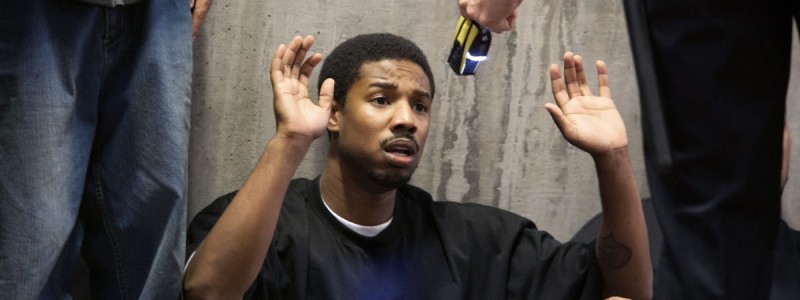On New Years Day 2009 a young, handcuffed black American was shot in the back by a policeman holding him face-down on the platform of Fruitvale station. This is the opening scene of the film, based on the true story of Oscar Grant, played by Michael Bakari Jordan and the reconstruction of his last day from court transcripts by first time director Ryan Coogler. The young white policeman who shot him claimed he believed he was holding a taser, not a shotgun. The incident was filmed on mobile phones film and went viral across social networks. What the film doesn’t show are the riots that followed, or the disturbances sparked by the 11 month sentence given to the young white policeman who shot him.
The shocking scene on the station platform stays in your head throughout the film, adding extra intensity and poignancy to the mundane and often complicated events that make up 22 year old Oscar’s last day. It builds a picture of a small-time drug dealer and unfaithful husband, sometimes wired up and angry and often gentle, struggling to straighten himself out and be a good dad to his young daughter and partner to his wife. He loves them both, and he loves his mother, played by Octavia Spencer, who manages to convey the suppressed fear that parents feel when their young adult children set out into the city to party, especially if their child is black. Black people in the US (and the UK) are far more likely to be stopped and arrested by police. Oscar spends his last evening celebrating his mother’s birthday with his extended family in scenes that add to the poignancy of his final, brutal end on the station platform in Oakland, California. It’s her advice that leads him to take that fateful train journey into the city which ends with him being dragged off a carriage following a minor disturbance.
It’s a harrowing personal story but it’s also a powerful political film and perhaps that’s why it’s received such critical attacks in the US. It’s been accused of emotionally manipulating its audiences, and many of the criticisms hang on the question of whether Oscar was genuinely trying to reform his life and seek redemption. It seems a cruelly irrelevant question in the face of the reality of an innocent, black man fatally shot in the back on a railway station by a policeman.

